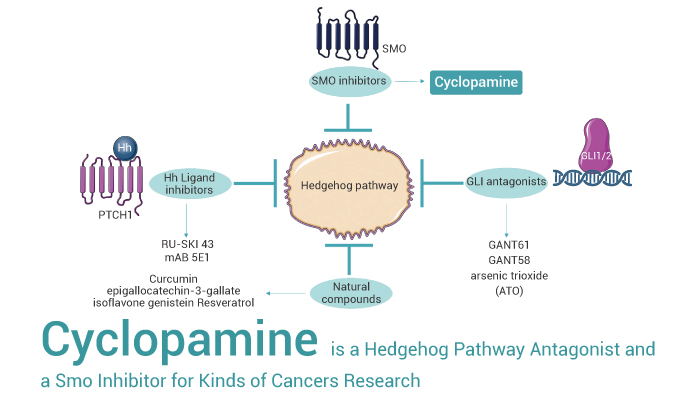Hedgehog is important for the organogenesis of almost all organs in mammals, as well as in regeneration and homeostasis. Sonic Hedgehog (Shh) pathway is important for the evolution of radio and chemo-resistance of several types of tumors. There are three mammalian Hedgehog proteins, Shh, Indian-Hedgehog (Ihh), and Desert-Hedgehog (Dhh). Shh and Ihh have important, and sometimes coinciding, functions in several tissues. Shh has particularly marked roles in nervous system cell type specification and limbs patterning, whereas Ihh has important roles in skeletal development, mainly endochondral ossification. Dhh is restricted to the gonads including granulosa cells of ovaries and sertoli cells of testis. Moreover, several studies have investigated the role of Hedgehog-Gli signaling in cancer initiating stem cells (CSCs) and suggested that it regulates self-renewal and tumorigenic potential.
Smo receptor, a key signal transducer in the Hedgehog signalling pathway, is responsible for the maintenance of normal embryonic development and is implicated in carcinogenesis. In the absence of Hh ligand, Ptch inhibits signaling by Smo. Binding of Hh to Ptch triggers its internalization and degradation, thereby allowing Smo to accumulate and signal to intracellular effectors.
Cyclopamine is a Hedgehog pathway antagonist and also a selective Smo inhibitor
The steroidal alkaloid Cyclopamine has both teratogenic and antitumor activities arising from its ability to specifically block cellular responses to vertebrate Hedgehog signaling. Cyclopamine also can reverse the retention of partially misfolded Smo in the endoplasmic reticulum, presumably through binding-mediated effects on protein conformation. Therefore, Cyclopamine suppresses cell growth. Cyclopamine suppression of Hh pathway activity and growth in digestive tract tumour cell lines correlates with expression of PTCHmRNA. Cyclopamine is a steroidal alkaloid that inhibits Hh signalling through direct interaction with Smo. Treatment with Cyclopamine, which binding to Smo, induces tumor remission in a genetic mouse model of medulloblastoma. Besides, Cyclopamine blocks tumour formation of human pancreatic adenocarcinoma cells after transplantation into nude mice.
All in all, Cyclopamine is a Hedgehog pathway antagonist and a Smo inhibitor for kinds of cancers research.
References:
[1] Carballo GB, et, al. Cell Commun Signal. 2018 Mar 20;16(1):11.
[2] Arensdorf AM, et ,al. Trends Pharmacol Sci. 2016 Jan;37(1):62-72.
[2] Chen JK, et, al. Genes Dev. 2002 Nov 1;16(21):2743-8.
